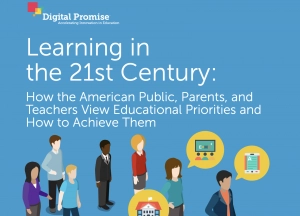Teacher Support Critical To Remote Learning Success
A broad gap exists between what the public wants and what they believe schools are able to provide, according to the latest survey conducted by Langer Research of New York for Digital Promise’s Learner Variability Project. At least eight in 10 of those surveyed recognize that students vary in how they learn, say schools should address this learner variability, and favor tailored instruction over conventional whole group instruction.
 Yet, nine in 10 teachers, about eight in 10 Americans overall, and three-quarters of parents with children in public schools say teachers do not have the support they need to focus on a learner’s variability. Most teachers also say they do not have the time nor the professional learning opportunities.
Yet, nine in 10 teachers, about eight in 10 Americans overall, and three-quarters of parents with children in public schools say teachers do not have the support they need to focus on a learner’s variability. Most teachers also say they do not have the time nor the professional learning opportunities.
The survey was administered in the fall of 2019, before the outbreak of COVID-19. However, the findings remain relevant, perhaps even moreso. As physical schools closed, teachers and other educators quickly pivoted to digital learning; as such, they require even more time, support, and professional learning experiences to help them continue teaching and learning in an online world. “For educators to create powerful learning experiences that address learner variability, they need sufficient support as well as professional learning experiences that are high quality and meaningful,” said Karen Cator, president and CEO of Digital Promise. “At a time when so much learning has gone digital, it is critical that teachers play strong roles in selecting edtech and feel comfortable in using it to support every learner.”
Specific education technology findings include:
- Ninety-three percent of teachers surveyed say they use educational technology (edtech) because they believe it supports their work with student learner variability.
- Teachers who report higher comfort levels with new software and apps are more apt to use edtech frequently to address learner variability, and are more likely to use it to tailor instruction.
- Teachers who report having a lot or good amount of input on selecting edtech products are three times as likely as others to say the edtech they use is very effective in helping them support student learner variability.
- Those who report more input also are nearly twice as likely to say they often use data from edtech products to help them support learner variability.
“The survey confirms that teachers believe academic research can offer critical insights into teaching and learning,” said Vic Vuchic, chief innovation officer at Digital Promise. “These findings fit well with what informs our work on the Learner Variability Project, where we translate research and make it actionable for teachers and educators to help each learner reach their potential.”







